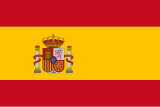Spanish Federation of Sports for the Deaf
| Sport | Deaflympics |
|---|---|
| Jurisdiction | Spain |
| Abbreviation | FEDS |
| Founded | 1993 |
| Affiliation | CISS |
| Location | Barcelona, Spain |
Spanish Federation of Sports for the Deaf (Spanish: Federación Española de Deportes para Sordos (FEDS)) is the national governing body for deaf sports in Spain. Based in Madrid and created in 1993, they are one of five disability sport organizations that are members of the Spanish Paralympic Committee.
The Spanish Federation of Sports for the Deaf is responsible for sending, supporting and funding deaf athletes representing Spain at the Deaflympics and in other Deaf Championships.[1]
Governance[]
FEDS is one of five disability sport organizations that belongs to the Spanish Paralympic Committee which has the goal of hosting and governing disability sport on the local level around the country.[2][3] While it is a private organization, by law it has a public interest.[4][5] They are based in Madrid.[4] As of November 2013, became the President of the organization.[6]
The organization is composed of regional sport federations[7] including the [8] .[9] , , , and .[10] Each autonomous region of Spain is allowed to have its own regional deaf sport organization belonging to FEDS. The presidents of these federations make up the general assembly for FEDS.[7]
The organization is a member of the .[4] They are affiliated with International Committee of Sports for the Deaf (CISS), the (ICSC), the (EDSO), the Spanish Olympic Committee (COE) and the Spanish Paralympic Committee (CPE).[4] Through the Spanish Paralympic Committee, one of their sponsors is Renfe Operadora.[11]
Sports the organization supports include athletics, basketball, cycling, tennis, table tennis, football, futsal, 7-a-side football and pétanque.[9] For competition purposes in events organized by FEDS, sportspeople must have hearing loss of at least 55 decibels.[7]
History[]
The Spanish Committee of Silent Sports was created in 1949.[12] Marcos Anavi Benavideste was the group's first president, a position he would stay in for ten years.[13] As a result of the increase in participation and interest in the disability during the late 1960s, then president of the Spanish Olympic Committee Juan Antonio Samaranch charged to create the Spanish Sports Federation for the Physically Disabled. While originally created only for people with physical disabilities, it soon became a catchall organization representing multiple disability types including people with hearing impairments.[9][14] In 1990, the General Law of Sports was passed, (Spanish: Ley General del Deporte) which led to changes in how sport was organized inside Spain. Eventually, changes in response to the law assisted in creating a landscape that resulted in the creation of several national Spanish disability sport organizations including this one,[15][16] which was created in May 1993.[5][17]
References[]
- ^ "Spain | Deaflympics". www.deaflympics.com. Retrieved 2017-10-14.
- ^ Comité Paralímpico Español. "Comité Paralímpico Español". Juegos Paralímpicos Vancouver 2010, Dossier de Prensa (in Spanish). Madrid, Spain: Comité Paralímpico Español. p. 19.
- ^ "Deportes | Juegos Olímpicos | Estrellas" (in Spanish). Spain: elmundo.es. Retrieved December 16, 2013.
- ^ Jump up to: a b c d "Documento BOE-A-2013-7785" (in Spanish). Spain: BOE.es. 2013-07-15. Retrieved December 16, 2013.
- ^ Jump up to: a b "Documento BOE-A-2009-16985" (in Spanish). Spain: BOE.es. Retrieved December 16, 2013.
- ^ "Santiago Poveda, nuevo presidente de la FEDS" (in Spanish). Spain: Feds.es. Archived from the original on December 7, 2013. Retrieved December 16, 2013.
- ^ Jump up to: a b c "Documento BOE-A-1993-25046" (in Spanish). Spain: BOE.es. Retrieved December 16, 2013.
- ^ Juan José Avendaño Valentine; Nuria Escribano Blasco; Elia Delgado Pardo; Sabina Martinez Rodriguez; Francisco Javier Sanchez Zamorano; Maria José Abelairas Santos (2003). "Notas sobre el Hockey en Silla de Ruedas Eléctrica" (PDF) (in Spanish). Carlos González Tardón: 8. Retrieved December 13, 2013. Cite journal requires
|journal=(help) - ^ Jump up to: a b c Francisco Javier Durán Ruiz. "El Fomento De Laactividad Deportiva De Grupos Con Necesidades Especiales En Andalucía" (PDF). Anuario Andaluz De Derecho Deportivo (in Spanish). Spain (4): 146. Archived from the original (PDF) on December 17, 2013. Retrieved December 13, 2013.
- ^ "Documento BOE-A-1999-22139" (in Spanish). Spain: BOE.es. Retrieved December 16, 2013.
- ^ "Compromiso con la Cultura, el Deporte y la Educación" (in Spanish). Spain: Renfe.com. Retrieved December 16, 2013.
- ^ "Sociedad Federada de Personas Sordas de Málaga - Nuestra Historia" (in Spanish). Spain: Sfsm.es. Retrieved December 16, 2013.
- ^ "Deporte. En mi/tu ayuda" (in Spanish). Spain: Chopo.pntic.mec.es. Retrieved December 16, 2013.
- ^ José Antonio Carrascosa Sanz; Javier Pérez Tejero; Juan Vázquez Menlle; Pablo Arroyo Castro; Miguel Ángel Pérez Tello. "El porqué del deporte adaptado" (PDF). Actas de las Jornadas Internacionales de Actividad Física y Salud (in Spanish). Spain: 426. Archived from the original (PDF) on July 14, 2013. Retrieved December 13, 2013.
- ^ José Antonio Carrascosa Sanz; Javier Pérez Tejero; Juan Vázquez Menlle; Pablo Arroyo Castro; Miguel Ángel Pérez Tello. "El porqué del deporte adaptado" (PDF). Actas de las Jornadas Internacionales de Actividad Física y Salud (in Spanish). Spain: 427. Archived from the original (PDF) on July 14, 2013. Retrieved December 13, 2013.
- ^ "Jefatura del Estado "BOE" núm. 249, de 17 de octubre de 1990 Referencia: BOE-A-1990-25037" (PDF) (in Spanish). Madrid, Spain: Boletin Oficial del Estado.
- ^ James Riordan; Arnd Krüger (1 January 2003). European Cultures in Sport: Examining the Nations and Regions. Intellect Books. pp. 133–134. ISBN 978-1-84150-014-0.
External links[]
- Sports governing bodies in Spain
- Sports organizations established in 1993
- Parasports organisations in Spain
- Deaf sports organizations
- Deaf culture in Spain
